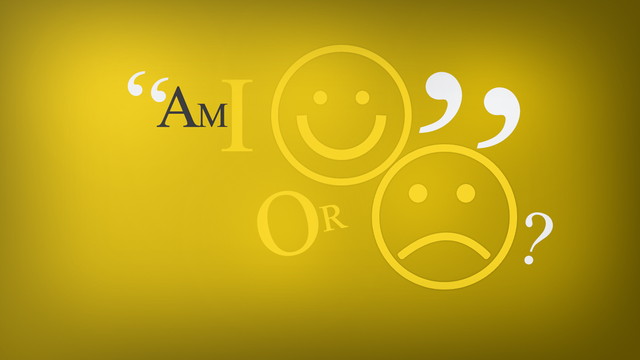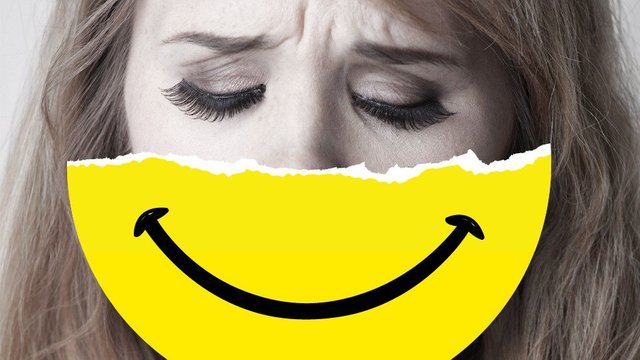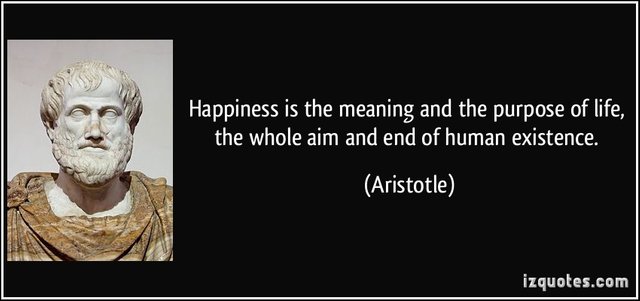The Notion of Morality and Happiness
What is morality? What makes us happy? Have you ever ask yourself if you are happy?

Everyone works so hard from dawn to dusk in order to achieve one purpose in life--Happiness. But there is question that needs to be answered, “What is happiness and how can it be achieved?” Throughout the world, bias has been part of everyone’s life, so the society and the culture that one lives and experiences is the most important factor that determines one’s tranquility. Thus, society has created social structures to maintain stability and at the same time, to control its people too. Because of this, people try to assimilate themselves to be moral. Thus, many philosophers come up one question: Is morality the fundamental principle for happiness?
To explore this topic more closely, three philosophers: Rand, Aristotle, and Locke will be discussing the definition of happiness and how morality does relate to happiness. Since one was born, society shapes one’s development. Therefore society teaches people to be moral and some even generalize that being moral helps people to make the best choice in the society. Therefore, morality is seen to be a fundamental principle of happiness.
People might have agreed that happiness is the feeling of joy and excitement, physically and mentally or it’s more than that. The pleasure in life and the moment of smiling give the best memory and relaxation. Even though this is the case, what does happiness mean to you? By this, different people will answer this question differently and the answers might be varied from one group of people to another and from one nation to the next. In other word, happiness is a deep and intrinsic core of your life. It’s meant to be a long term judgment in retrospect to your life experiences and it’s the mean of all the memories you earned throughout your lifetime. Nevertheless, some people see that happiness link to morality and thus, to calculate the mean of one’s life morality always be part of one’s mean.

Even though some see that morality is relatively essential to happiness, some critics try to prove that morality and happiness cannot exist in the same situation. Kant, a Russian philosopher never believe that morality co-exist with happiness because he thinks that these two ideas are distantly unrelated. He sees that one can achieves happiness without being ethical and thus being ethical is just a worthy of happiness. For example, if the thief robs a bank and if the crime is successful, it would make them happy. Thus, Kant would claim that it is the most important to get whatever you want, so as long as the thief is able to get all of the money he wants and not get caught, it’s his happiness. The notion of morality makes nonsense and “if morality is defined in term of happiness, not everyone can be moral, which seems wrong” (Hughes 2). Despite Kant’s argument above, Kant has not really address one reason why people try to follow social setup to fulfill their life’s happiness. What Kant just argued is just a small reason behind the notion of happiness, and if Kant strongly claims that the act of selfishness is most important, then everyone would just crazily desired things. But this does not happen; everyone tries to obey rules as much as they can because that is part of the social requirement. If they can do it, then they would consider themselves in a peaceful state and has achieved happiness. Although, the notion of happiness seems relatively connected to the instant pleasure, it is not really the deeper meaning of happiness. Kant urges people to be selfish and this act of selfishness is just an instant pleasure which contradict the idea of happiness. Later on, they will realize that they have done something wrong and they will regret whatever they have done, so at the end they gain nothing in life except the feeling of remorse. On the hand, if people live ethically, at the end they will find their lives remarkably meaningful, and that is the mean of their lives.
Statistically, out of the world population, only a very small percentage that lives in jail; others are free to live their lives because they live morally, and by this, it means without breaking the rules. This is why people see morality as the most important guideline to happiness. John Locke, an English philosopher, noted that virtue also contribute to happiness. Simply, this means that acting virtuously will make one reach the contentment of his or her life. Locke would support that morality would bring the most out of your life, and “the best bet would be to live a life of virtue so one can win everlasting happiness. Betting on a life of hedonistic pleasure is ‘irrational’ given the prospect of infinite misery” (John Locke 3). Sometimes, morality is an inner voice that helps to free us from any attachment to any desire and thus, happiness comes from the feeling of satisfaction, mainly having no desire.
According to Aristotle, happiness is one’s mean in life. The number one ultimate goal of life is happiness and “that virtue is achieved by maintaining the Mean, which is the balance between two excesses” (Aristotle 1). Basically, he believes happiness is not pleasure because happiness is measured by the mean throughout one’s life. He explains further that happiness is not virtue but it is the exercise of virtue. In short, in order to be happy, one must practice virtue. By practicing virtue, human will be able to reason and exercise this reason. So, human happiness depends on how well virtue is being practiced. Aristotle makes even clear that “happiness depends on acquiring a moral character, where one displays the virtues of courage, generosity, justice, friendship, and citizenship of one’s life” (Aristotle 5). This is the most important factor for maintaining the inner tranquility. To be moral one must shows a variety of positive actions and this requires intellectual thoughts and the realization of rational capacities. If one could achieve these requirements, being moral is just as simple as it is and one could just achieve the mean in life. The “middle path” is what Aristotle thinks as a complex calculation of the mean from practicing virtues and the doctrine of virtue is a “golden mean”. Living with virtue is like living with little fear or without any fear, thus this explains the reason of human existence.

Another standout philosopher who strongly believes in the notion of happiness and morality is Ayn Rand, a Russian American philosopher. Rand is the most controversial philosopher in the 21st century because she argues that it is one’s responsibility to create happiness. In order to do so, one has to follow his or her own desires. Regardless of individual desires, one must think before acting. This relates to the idea of morality because Rand claims that being well is very important and living morally or with integrity would guide one’s life to happiness. Even though, Rand agrees with Kant that Selfishness is more important, she also clearly states that one cannot wish for happiness, so one must take an active role to earn it and morality will be a tool to help you achieve happiness successfully. In other word, being selfish is not the only way that determines one’s happiness because if one is so selfish and has no moral, Rand would not agree because that still not a practical. This seems very useless. Though, if happiness could be achieved, it must be ethical and thoughtful, and Rand would say that the act of selfishness will be involved.
Overall, morality is so essential for determining and measuring one’s happiness. Being moral is like earning more positive credits for life so that at the end one can see the “mean” of it. All though some people agree with Kant’s philosophy that sometimes being immoral can also be happy, the majority of the world strongly urge for morality so that everyone can live in peace regardless of difference ideology of morality.